As most Indians self-isolate to ‘flatten the coronavirus curve’, schools and colleges close and companies allow work from home to tackle the COVID-19 pandemic, ThePrint and Penguin Random House India bring a list of books to read in March and April.
The Coronavirus: What you Need to Know about the Global Pandemic
by Dr Swapneil Parikh, Maherra Desai and Dr Rajesh Parikh
 On the eve of 31 December 2019, as the world celebrated the start of a new decade, the province of Wuhan alerted the World Health Organization of several ‘flu-like’ cases. Less than a week later, a novel coronavirus, was identified. In February, the disease it caused was named COVID-19. Even now, as the global infection rate crosses 1,00,000 and the death toll surpasses 3,000, we are yet to understand the threat posed by this new coronavirus. There is no vaccination to prevent it, and no antiviral to cure the sick. While high numbers are being reported daily, agencies may still be unaware of many cases.
On the eve of 31 December 2019, as the world celebrated the start of a new decade, the province of Wuhan alerted the World Health Organization of several ‘flu-like’ cases. Less than a week later, a novel coronavirus, was identified. In February, the disease it caused was named COVID-19. Even now, as the global infection rate crosses 1,00,000 and the death toll surpasses 3,000, we are yet to understand the threat posed by this new coronavirus. There is no vaccination to prevent it, and no antiviral to cure the sick. While high numbers are being reported daily, agencies may still be unaware of many cases.
The symptoms of coronavirus are dangerously similar to that of the common flu: fever, coughing, breathlessness, tiredness, headache and muscle pain. But in India, that has such a high population density, we will have to do more than just stick to Namaste to greet each other. It seems that a crippling pandemic is inevitable. While some of us may find it easier to resign ourselves to fate, what we need most right now is credible and comprehensive information from professionals that can help us understand what the Coronavirus is, and how we can prepare and protect ourselves against it. This is the first book that addresses the history, evolution, facts and myths around the pandemic. The Coronavirus is a timely must-read for everyone keen on understanding its impact and fallout.
(to be published in April)
Cricket 2.0
By Tim Wigmore and Freddie Wilde, with forewords by Harsha Bhogle and Michael Vaughan
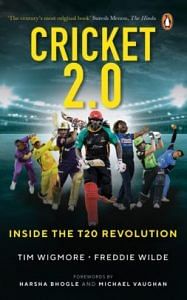 Cricket 2.0 tells the story of how an old, traditional game was transformed by Twenty20 and how this format moved from being a gimmick to the face of modern cricket.
Cricket 2.0 tells the story of how an old, traditional game was transformed by Twenty20 and how this format moved from being a gimmick to the face of modern cricket.
The iconic captain Brendon McCullum, England’s T20 visionaries Eoin Morgan and Jos Buttler and Trinidad’s Kieron Pollard and Sunil Nadine, who rose to become among the first T20 millionaires, explain how they shaped T20 — and how it shaped them. Test greats Rahul Dravid and Ricky Ponting recount what a sea-change T20 represented and decode T20 strategy. AB de Villiers explores the limits of modern batting. The Afghan phenomenon Rashid Khan shows that T20 superstars can now come from anywhere. Venky Mysore, the cricket revolutionary you have never heard of, reveals how the game is changing off the field.
Told through compelling human-interest stories and featuring interviews with more than fifty players and coaches, Tim Wigmore and Freddie Wilde examine how a cocktail of globalisation, new aggressive tactics and huge investment are changing the sport faster than ever before, while analysing the myriad ways in which a traditional game has been revolutionised forever, both on and off the pitch.
This is the extraordinary and previously misunderstood story of Twenty20 cricket – told by two people who have chronicled the revolution. Featuring exclusive interviews with figures including: Eoin Morgan, Jos Buttler, Brendon McCullum, Rashid Khan, Ricky Ponting, Rahul Dravid and Tom Moody.
(to be published in April)
Also read: My memories of being in RSS shakha are very different: Milind Soman
A Talib’s Tale: The Life and Times of a Pashtoon Englishman
By John Butt
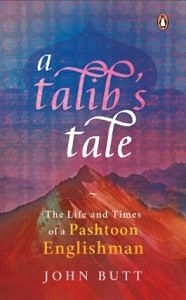 John Butt came to Swat in 1970 as a young man in search of an education he couldn’t get from his birthplace in England. He travels around the region, first only with friends from his home country, but as he befriends the locals and starts to learn about their culture and life, he soon finds his heart turning irrevocably Pashtoon.
John Butt came to Swat in 1970 as a young man in search of an education he couldn’t get from his birthplace in England. He travels around the region, first only with friends from his home country, but as he befriends the locals and starts to learn about their culture and life, he soon finds his heart turning irrevocably Pashtoon.
Containing anecdotes from his life both before and since he shifted to Afghanistan, and with a keen and optimistic attitude towards becoming the best version of himself, John Butt tells a wonderful and heartfelt tale of a man who finds a home in the most unexpected place.
(to be published in March)
Fearless: Stories of Amazing Women from Pakistan
By Amneh Shaikh-Farooqui and Aziza Ahmad
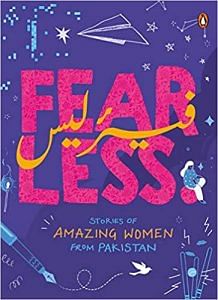 Through the ages, strong, inspirational women and girls have risen in response to uncertainty and injustice. A timeless call to arms that many like Fatima Jinnah, Asma Jehangir, Sheema Kirmani, Nighat Dad and Malala Yousafzai have always been answering. Demonstrating that one girl can change everything.
Through the ages, strong, inspirational women and girls have risen in response to uncertainty and injustice. A timeless call to arms that many like Fatima Jinnah, Asma Jehangir, Sheema Kirmani, Nighat Dad and Malala Yousafzai have always been answering. Demonstrating that one girl can change everything.
The book chronicles the lives of 50 such incredible Pakistani women-scientists, lawyers, politicians, activists and artists-who incite hope, inspire action and initiate dialogue. Fiercely bold, this beautifully illustrated book holds up a mirror to South Asians across the world and highlights that their voices are crucial.
Also read: Pakistan TV and Pakistan Radio were guilty pleasures of many Kashmiris after Independence
The Other Side of the Divide
by Sameer Arshad Khatlani
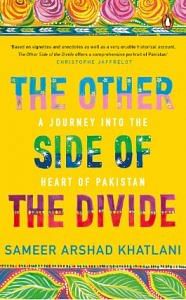 Pegged on journalist Sameer Arshad Khatlani’s visit to Pakistan, this book provides insights into the country beyond what we already know about it. These include details on the impact of India’s soft power, thanks to Bollywood, and the remnants of Pakistan’s multireligious past, and how it frittered away advantages of impressive growth in the first three decades of its existence by embracing religious conservatism.
Pegged on journalist Sameer Arshad Khatlani’s visit to Pakistan, this book provides insights into the country beyond what we already know about it. These include details on the impact of India’s soft power, thanks to Bollywood, and the remnants of Pakistan’s multireligious past, and how it frittered away advantages of impressive growth in the first three decades of its existence by embracing religious conservatism.
The book profiles extraordinary people-lawyers, poets, musicians and even a former military chief-who stood up to an oppressive state. It has historical anecdotes, like the story of an ordinary woman who became the ‘muse and mistress’, and often the ‘brains behind the regime of a swinging general’ who led Pakistan to ignominy in the 1971 war, that of a Sikh family which dared to swim against the tide to stay back in Pakistan after Partition, and a prostitute’s son who uses his art to humanise commercial sex workers in defiance of a conservative society.
The book attempts to present a contemporary portrait of Pakistan-where prohibition remains only on paper and one of the biggest taxpayers is a Parsee-owned brewery-as a complicated and conflicted country suspended between tradition and modernity.
(published in February)
The RSS: And the Making of the Deep Nation
By Dinesh Narayanan
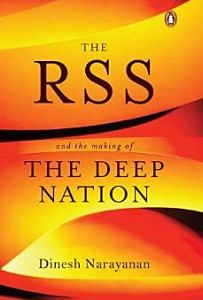 Since its inception in 1925, the RSS has perplexed observers with its organisational skills, military discipline and single-minded quest for influence in all walks of Indian life. Often seen as insidious and banned thrice, the pace of its growth and ideological dominance of the political landscape in the second decade of the millennium have been remarkable. It believes that Hindus have exclusive ownership of the Indian nation or Bharat, as it prefers to call it, and that hitherto, forces inimical to the interests of Hindus were deciding the sociopolitical and economic agenda in India. With political power firmly in favour, it is now going all out to embed its ideology deep in India’s genetic code.
Since its inception in 1925, the RSS has perplexed observers with its organisational skills, military discipline and single-minded quest for influence in all walks of Indian life. Often seen as insidious and banned thrice, the pace of its growth and ideological dominance of the political landscape in the second decade of the millennium have been remarkable. It believes that Hindus have exclusive ownership of the Indian nation or Bharat, as it prefers to call it, and that hitherto, forces inimical to the interests of Hindus were deciding the sociopolitical and economic agenda in India. With political power firmly in favour, it is now going all out to embed its ideology deep in India’s genetic code.
The abrogation of Article 370 in Kashmir, the big push to construct a Ram Temple in Ayodhya and moves to amend personal laws are the first symbolic steps in establishing the primacy of Hindus in the affairs of the country. Relying on original research, interviews with insiders and analysis of current events, The RSS and the Making of the Deep Nation traces the RSS’s roots and nearly century-long operations in the relentless pursuit for ideological dominance in a nation known for its rich diversity of thought, custom and ritual.
(to be published in March)



